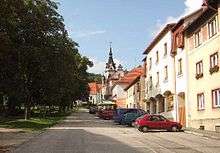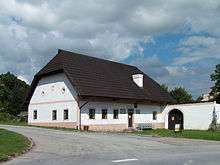Horní Planá
| Horní Planá | |||
| Town | |||
 View from Lipno reservoir | |||
|
|||
| Country | Czech Republic | ||
|---|---|---|---|
| Region | South Bohemian | ||
| District | Český Krumlov | ||
| Commune | Český Krumlov | ||
| Municipality | Horní Planá | ||
| Elevation | 776 m (2,546 ft) | ||
| Coordinates | 48°46′2.5″N 14°1′57.27″E / 48.767361°N 14.0325750°ECoordinates: 48°46′2.5″N 14°1′57.27″E / 48.767361°N 14.0325750°E | ||
| Area | 99.26 km2 (38.32 sq mi) | ||
| Population | 2,287 (2005) | ||
| Density | 23/km2 (60/sq mi) | ||
| Mayor | Jiří Hůlka | ||
| Timezone | CET (UTC+1) | ||
| - summer (DST) | CEST (UTC+2) | ||
| Postal code | 382 26 | ||
  Location in the Czech Republic | |||
| Wikimedia Commons: Horní Planá | |||
| Statistics: statnisprava.cz | |||
| Website: www.horniplana.cz | |||
Horní Planá (German: Oberplan) is a town in Český Krumlov District, in South Bohemia, Czech Republic.
Geography

The town is situated in the Bohemian Forest on the southeastern rim of the Šumava National Park, located on the northern shore of the Lipno Dam reservoir, south of the Boletice Military Training Area. Its picturesque setting, already perpetuated by the native poet Adalbert Stifter (1805–1868), makes it a popular destination for daytrippers. Beyond the Lipno reservoir, a densely forested area with several abandoned villages stretches up to the Vltava-Danube drainage divide (part of the main European Watershed) and the border with Austria at a distance of about 7 km (4 mi).
History
Horní Planá was part of the estates of Zlatá Koruna Abbey, founded by the Přemyslid king Ottokar II of Bohemia in 1263. It was vested with market rights by King Charles IV in 1349. Secularised during the Hussite Wars in 1420, it was incorporated into the Lordship of Český Krumlov, then held by the House of Rosenberg (Rožmberkové). The Rosenberg insignia were adopted in the town's coat of arms, awarded by the Holy Roman emperor and King of Bohemia Maximilian II in 1568.
The town received access to the United Bohemian Forest railway line from České Budějovice to the Černý Kříž railhub in 1892. Until 1945 the local population predominantly consisted of Sudeten Germans.
In October 1938, the Donau-Zeitung reported about the German Oberst Schlemmer and his Gebirgsjägerregiment 100 crossing into Glöckelberg, six km from Oberplan. Shortly before 2 pm, Generaloberst Leeb, commander of XIII. Armeekorps, and Ritter von Schubert, commander of VII Armeekorps, arrived by car to cross the border right in front of these men.[1] Oberplan was annexed by Nazi Germany upon the 1938 Munich Agreement and incorporated into the Reichsgau Oberdonau.
In May 1945, US troops under command of Major General Stafford LeRoy Irwin captured the community.[2] After World War II, it was restored to the Czechoslovak Republic, while the remaining German population was expelled.
Notable people

- Adolf Martin Pleischl (1787–1867), chemist and medical doctor
- Adalbert Stifter (1805–1868), writer, poet, painter, and pedagogue
References
External links
| Wikimedia Commons has media related to Horní Planá. |
- (in Czech) Official website

